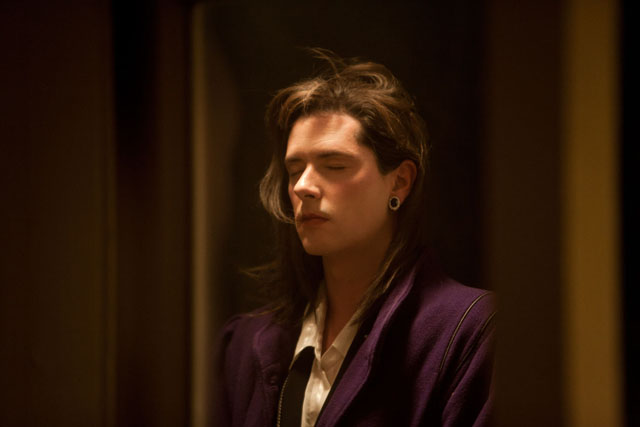Let’s begin with the LA Weekly‘s Karina Longworth: “My big issue with 23 year-old French-Canadian wunderkind Xavier Dolan’s second feature, Heartbeats, was the lip service the film paid to defining a generation’s mating habits, while in practice devoting what seemed like 70 percent of the running time to music video-style montages of his hyper-stylish characters looking really fucking terrific. Dolan’s third feature, Laurence Anyways, is the longest film playing in any of Cannes programs—two hours and 39 minutes—and it would probably be more like two hours if all the slo-mo enhancing the many, many sexy montages set to early-80s club tracks (oh, right—Visage was a thing) was run at regular-mo instead. And Laurence Anyways is also a little too loud in its claim to generational summation—one character actually announces that her generation (the film is a period piece, tracking 30-somethings from the late 80s to the end of the milennium) is the first ‘ready’ for alternative sexuality to be treated as a lifestyle mode, like punk, rather than a social aberration. What redeems the film, sort of, is the ways in which that proclamation is later called into question by soap operatic, but almost-realistically complicated, human behavior.”
“Portraying the decade during which he became a man, Xavier Dolan tells the story of Laurence (Melvil Poupaud) who becomes a woman,” explains Domenico La Porta at Cineuropa. “But Laurence is not gay, and this quest for identity includes a turbulent love story with Fred (Suzanne Clement) that continuously explodes and implodes under social pressures and the couple’s fundamental questioning. Dolan has chosen the 1990s as the backdrop to his screenplay, as the story is about evolution, social acceptability, and the space left to the marginalized, including members of the third sex. It’s the evolution that our society experienced from the end of the 1980s to the beginning of the noughties.”
“Where Dolan’s first two films were effectively ripped from his personal diaries, Laurence Anyways (a clever title made overly pat by the film’s final scene) is attempting to engage with experiences and sensations more foreign to him,” writes Guy Lodge at In Contention. “This is ostensibly nervy, big-thinking stuff, but the story leaves him with his wings a tad charred: for all the screen time in which the subject has to luxuriate, Laurence’s journey to womanhood is rendered in brushstrokes so vague and surface-focused as to call into question his interest in gender identity at all. Yves Belanger’s lovestruck camera lingers over the superficials of male-to-female transsexuality—Laurence’s deliberately harsh makeup scheme, his wardrobe, much of it more outlandishly androgynous than expressly feminine. But the psychological intricacies of Laurence’s decision, plus its finer physical, medical and sexual practicalities, are something about which the film remains markedly coy, perhaps because they’d invite questions to which he simply doesn’t know the answer.”
In Variety, Rob Nelson suggests that Laurence Anyways “stands to polarize more on the basis of its stylistic politics than its sexual ones. Indeed, the clearest achievement of Dolan’s typically self-indulgent eye-popper comes in equating its gender-bending protagonist’s metamorphoses with those in any relationship that lasts for years…. If not quite as floridly expressive as Dolan’s Heartbeats and I Killed My Mother, Laurence Anyways looks plenty dazzling; the filmmaker himself co-designed the vivid period costumes, which include the title character’s splendiferous array of scarves, shades, blouses, coats and pantsuits.”
“Poupaud, who took over the role from Louis Garrel at the 11th hour, gives an outstanding performance here, playing Laurence with a tender lack of camp, drama or hysteria,” writes Screen‘s Mike Goodridge. “Clement is more volatile and has a couple of knockout hysterical outbursts, one memorably with an over-inquisitive waitress. French legend Nathalie Baye gives a nice understated turn as Laurence’s mother.”
For Stephen Dalton, writing in the Hollywood Reporter, the film’s “been inexplicably relegated to the Un Certain Regard sidebar rather than the main Competition, Laurence Anyways is Dolan’s strongest pitch yet to have himself crowned Canada’s answer to Pedro Almodóvar. This sprawling exercise in high camp is maddeningly self-indulgent in places, but also stylish and original enough to merit an Almodovar-style commercial breakthrough.”
Mike D’Angelo, writing at the AV Club, finds “not even close to three hours of engrossing material here, and the superlative moments (including a restaurant outburst that rivals I Killed My Mother’s powerhouse, applause-inspiring Big Scene) wind up adrift in a vast sea of Poupaud-heavy indulgence.”
“Unwieldy and unkempt but both moving and dizzying to experience, Laurence Anyways is Dolan’s grandest statement yet,” declares the Playlist‘s Kevin Jagernauth. Interviews with Dolan: Eugene Hernandez (Film Society of Lincoln Center), Peter Knegt (indieWIRE), Chris Knight (National Post) and Anna Tatarska (Slant).
Update, 5/23: “With this glam epic, Dolan has made his most personal film yet,” writes Ryan Lattanzio at the Evening Class. “All he had to do was not cast himself in it.”
Cannes 2012 Index: a guide to the coverage of the coverage. For news and tips throughout the day every day, follow @KeyframeDaily on Twitter and/or the RSS feed.





